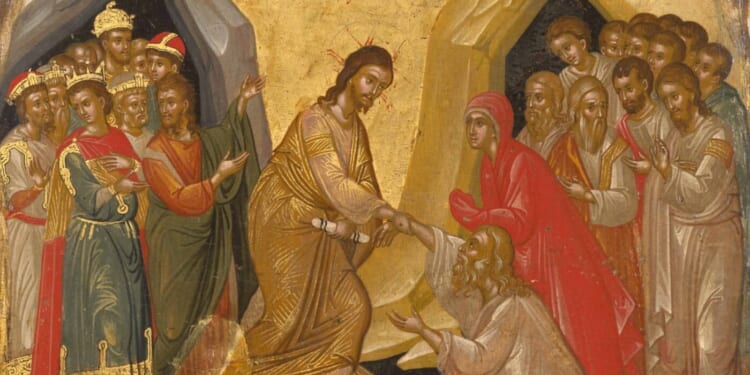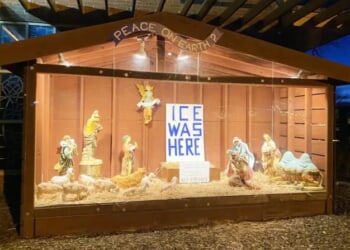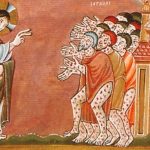In this Sunday’s Gospel, Jesus describes the purpose that God the Father had in sending Him to us. What was it?
Gospel: Read Jn. 6:37-40
On the Feast of All Souls, when we remember with love all those who have died, the Church gives us a reading taken from the Bread of Life discourse in St. John’s Gospel (Jn. 6:22-71). The context is familiar, then, as we hear portions of it throughout the liturgical year. It’s best known for its teaching on Jesus giving His own Flesh and Blood for the life of the world, the food and drink of our salvation; however, there are other teachings in this great passage that deserve our attention, and the Church presents us with one of them now. When we understand it, our celebration of the Feast of All Souls will be wonderfully enriched.
The setting for this Sunday’s reading is the discussion Jesus had with people who sought Him out after His miraculous feeding of the five thousand from five loaves of bread and two fish. They were eager for more—more food, more miracles, more time with Jesus. As He began teaching them, however, some of those present found His words difficult to understand and/or accept. There were lots of questions, objections, and murmurings among them. Finally, when He boldly announced that to be saved, to have eternal life, they would have to eat His Flesh and drink His Blood, they’d had enough. They didn’t want to hear any more of this, so “many of his disciples drew back and no longer followed him” (Jn. 6:66).
Before that happened, Jesus told the crowd that the whole purpose of His life—the reason His Father sent Him down to us—was that He “should not lose anything of what he gave me, but that I should raise it on the last day” (Jn. 6:39). We could ask, “What had God given Him?” The answer comes on the feast day the Church celebrates on the last Sunday of November: Our Lord, Jesus Christ, King of the Universe. God gave Jesus the whole universe!
There is nothing, nothing in the universe, that is outside of the loving arms of Jesus. The Father laid it all in His arms to accomplish the great plan He had for His Creation from “before the foundation of the world” (Eph. 1:4). Death would not have the final word in our human story. Jesus’ own Death and then Resurrection guarantees that for us all.
The New Testament assures us that God wants all people to share in the victory Christ won for us. St. Paul says that God “…desires all men to be saved and to come to the knowledge of the truth” (1 Tim. 1:4). St. Peter says that God does not wish “that any should perish, but that all should reach repentance” (2 Pet. 3:9). St. John says, “For God sent the Son into the world, not to condemn the world, but that the world might be saved through him” (Jn. 3:17). In the parables of the lost sheep and the lost coin, Jesus taught us that the Good Shepherd goes out to find that which was lost. He doesn’t want even one of His treasures, the ones for whom He died, to be lost.
This should give us strong confidence and hope as we remember and pray for our dead on the Feast of All Souls. We know that some of the dead professed Christian Faith and lived it with conviction to the end. Some were perhaps baptized but fell away from an active participation in life as a follower of Jesus. Others were never baptized or given any instruction at all on the Gospel, on how to receive the gifts God has given us in Jesus. And certainly, there are some who rejected Christian Faith, or thought they had. Among these are some of our own family members and friends. When we think of them on this day, we should remind ourselves that God has a stronger love for them than ours; His desire for them to share heaven with Him began before they were even born.
We lift our prayers for them to the Father, asking that His mysterious, ever gracious work bless those who have died, those whom He created. The will of God—to love us eternally—is stronger even than death.
Praise His Holy Name!
Possible response: Lord, may those who are dying or will die today see the light of Christ before they leave this world.
First Reading (Read Wis. 3:1-9)
Many of us have heard these verses read during a funeral Mass. They are beautiful, poetic promises that can give profound hope to those who mourn their loved one’s passing: “…their passing away was thought an affliction and their going forth from us utter destruction. But they are in peace.” The verses go on to describe how God loves us so much that He undertakes the work of making us fit to share heaven with Him, both in this life and in the next.
The Epistle to the Hebrews in the New Testament tells us that just as earthly fathers discipline their children out of love for them, so God does for us: “For they disciplined us for a short time…but he disciplines us for our good, that we may share his holiness” (Heb. 12:10). Our reading tells us that “As gold in the furnace, [God] proves them, and as sacrificial offerings he took them to himself.”
The Church teaches us that those who die in God’s friendship (in other words, those who are not intentional, willful evildoers) but are imperfectly ready to behold the face of God enter purgatory. This is a part of heaven, not hell. God does for us whatever we couldn’t or wouldn’t, through sheer ignorance, do to make progress on our earthly path to holiness. This is a great mercy to us.
We should remember, too, that the universal Church constantly prays for the salvation of all people. The Rosary, likewise, prays down God’s mercy on all, especially those in most need.
These verses in our reading assure us that the dead are at peace “because grace and mercy are with [God’s] holy ones.” On this Feast of All Souls, we can rejoice in this treasured, consoling truth.
Possible response: Heavenly Father, thank you for your loving determination not to lose any one of us, even when we foolishly take steps away from you.
Psalm (Read Ps. 23)
Jesus once said to a crowd of His followers:
“Are not two sparrows sold for a penny? And not one of them will fall to the ground without your Father’s will. But even the hairs of your head are all numbered. Fear not, therefore; you are of more value than many sparrows.” (Mt. 10:29-31)
Which of us are so self-absorbed that we have actually counted every hair on our heads? None! Yet God’s loving interest in us goes so deep and is so complete that He knows even that about us.
As we read through Psalm 23, we are immediately calmed by its beautiful pastoral imagery—line upon line describing God’s loving, protective care for us. At every point in our lives, with every step that we take, we can know that “Only goodness and kindness follow me all the days of my life; and I shall dwell in the house of the LORD for years to come.” Let us, therefore, confidently and with great joy sing our psalm’s response: “The LORD is my shepherd; there is nothing I shall want.”
Possible response: The psalm is a response to our other readings. Read it again prayerfully to make it your own.
Second Reading (Read Rom. 5:5-11)
In these verses, St. Paul echoes all that our other readings have told us: God loves us and is always on our side. St. Paul makes his point with the dramatic demonstration of God’s love: “But God proves his love for us in that while we were still sinners Christ died for us.” The great Apostle marvels over this unimaginable mystery, as we should, too. “Indeed, if while we were enemies, we were reconciled to God through the death of his Son, how much more, once reconciled, will we be saved by his life.”
On this Feast of All Souls, as we pray for our dead, let us savor with gratitude the boundless hope Scripture and the Church give us about them. They are in God’s hands, and “they are at peace.”
Possible response: Eternal rest grant unto them, O Lord, and let perpetual light shine upon them. May the souls of all the faithful departed, through the mercy of God, rest in peace.
Image from Wikimedia Commons











